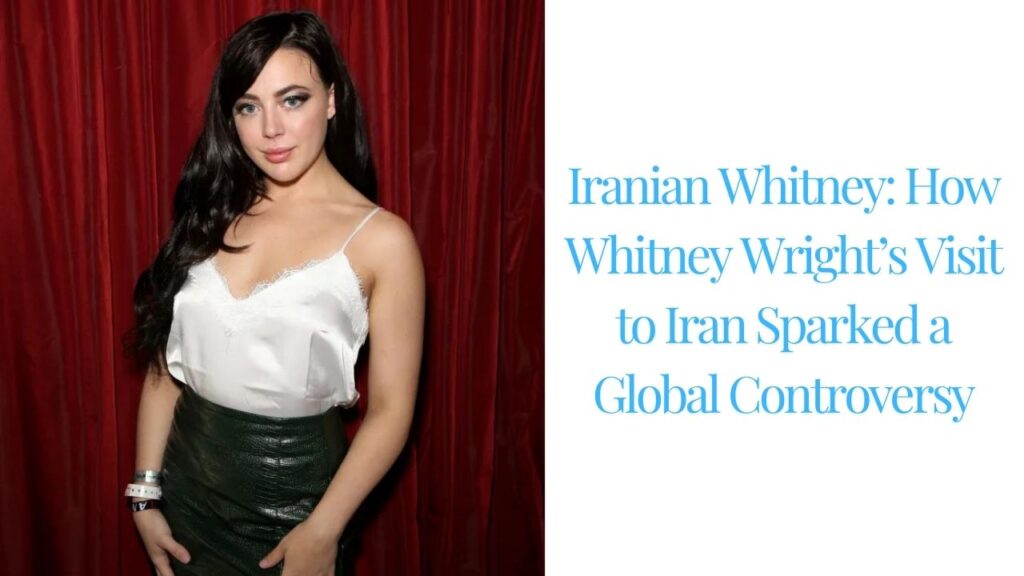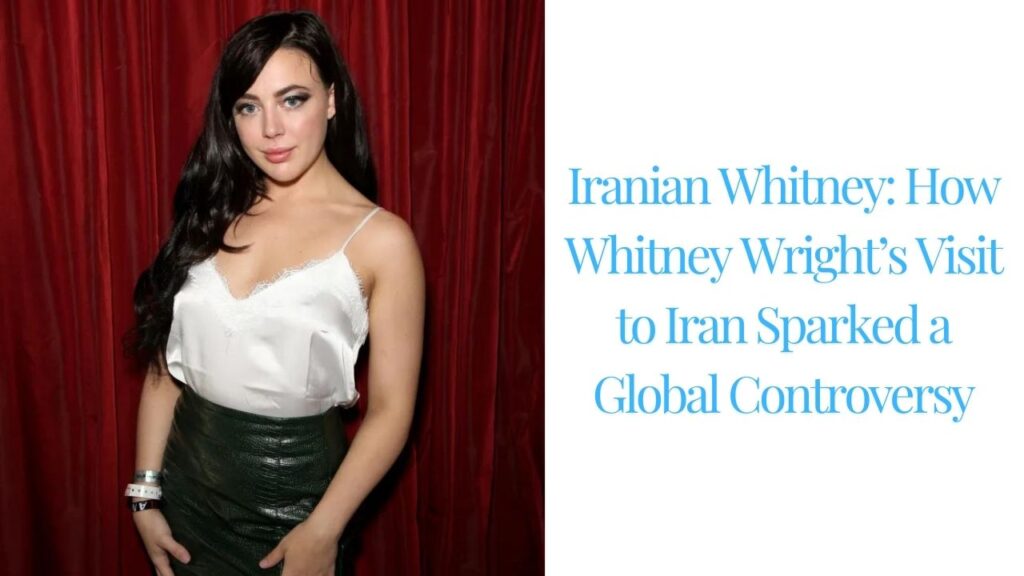At the start of February 2024, American adult film star Whitney Wright (Brittni Rayne Whittington), generated headlines when she announced her visit to Iran via social media posts. Although not widely recognized outside her industry, Oklahoma native Whitney quickly became a focus of international conversation due to her actions during what many have termed the infamous Iranian Whitney scandal. Questions were also raised about celebrity culture’s impact on politics and human rights issues.
Who Is Whitney Wright and Why Did She Visit Iran?
Whitney Wright has an established presence on platforms like OnlyFans, where she has garnered great success as an adult entertainer. But in February 2024, Whitney found her fame extended beyond only adult entertainment fans when she visited Tehran, Iran wearing hijab as per Iran’s strict dress code for female visitors. Her posts from her trip show she conformed fully to this strict dress code set forth by Iran for women travellers.
Wright visited several popular tourist spots, such as Sadabaad Palace and the International Arts Museum; she also visited the former U.S. Embassy which now stands as a monument commemorating the 1979 Iran Hostage Crisis Museum; though these locations would normally attract tourism, Wright’s choice to travel Iran — an oppressive regime known for human rights abuses — caused outrage from some quarters.
Why Did Whitney Wright’s Visit Provoke Controversy?
Whitney Wright’s visit was met with considerable backlash due to her position as an influential public figure and its context: Iran has long been condemned for its treatment of women, minorities and the LGBTQ+ community; strict laws govern everything from dress codes and freedom of expression rights, with recent events such as Mahsa Amini’s detention death reigniting international concerns about women’s rights within Iran.
Critics of Whitney Wright (known on social media as “Iranian Whitney”) accused her of supporting Iran’s oppressive Islamic Republic regime through her posts depicting an idealized version of Iran portrayed through photos showing Wright wearing traditional Iranian attire – seen by critics as failing to acknowledge the reality of life under such strict codes for Iranian women living there.
On Instagram, Alireza wrote, “We Iranians desperately wish we could leave Iran, yet here we remain. Regardless of your opinions on it all, Iran is no place worth living in.”
What has Whitney Wright posted regarding Iran?
Wright shared posts from Tehran via both Instagram and X (formerly Twitter), showing photos of herself at well-known landmarks wearing modest clothing that conformed with Iranian laws. One post she captioned with, “Tehran A Sweet Glimpse,” seemingly conveying an idyllic visit that did little to ease tensions or anger among some Iranians. Unfortunately, such attempts at tranquilization proved futile as protesters took note and threatened legal action over Wright.
Social media quickly erupted with accusations against Wright for her promotion of Iran’s regime, drawing condemnation both from Iranian activists and international observers alike. Masih Alinejad – an Iranian-American journalist known for her activism against compulsory hijab laws in Iran – noted one deleted tweet by Wright where it appears she wrote something like: If you respect the law you will stay safe in Iran. Critics found this comment highly insensitive as many Iranian women struggle against them themselves.
What Has Been the Reaction From Iranian Officials?
As word spread of Whitney Wright’s visit, Iran’s foreign ministry became involved. Nasser Kanani, spokesperson of their Foreign Ministry stated in a press conference that their government did not know of her visit and U.S. citizens are free to enter Iran without restriction or visa restrictions. Kanani noted Wright was unaware that adult entertainment is banned under Iranian law as such activities incur harsh punishment – potentially death penalties in certain instances.
An insider with knowledge of Iran’s visa system also verified that Wright did not arrive in Tehran as part of any official or private invitation, instead travelling solo.
What Was Whitney Wright’s Reaction to the Backlash?
As soon as she became aware of the growing outrage against her trip, Whitney Wright disabled comments on her Instagram posts and deactivated her X account. However, she stated in defence of it all by asserting, “Posting photos from my trip to Iran does not equate to supporting its government.” Furthermore, Wright justified visiting the former U.S. Embassy (venue of the 1979 hostage crisis), photographed beside an American flag being lowered during her visit there and claimed to share “exhibits from a museum that are rarely accessed” when asked by reporters about this location that may imply it was for historical/cultural reasons rather than any political sanctioned government sanction.
Although she attempted to clarify her actions, many critics remain dissatisfied. Iranian dissidents and activists saw Wright’s visit as being unattuned to the ongoing struggles of Iranian women against dress codes that Wright temporarily adhered to during her stay in Iran.
How Did “Iranian Whitney” Gain Popularity Worldwide?
The “Iranian Whitney” controversy sent shockwaves through global society, not only because of Wright’s celebrity status but because it exposed wider issues. Her visit came at a time when Iran was under scrutiny due to repressive government practices such as its treatment of protestors and harsh treatment of women; for many Iranians, Wright’s ability to visit Iran legally but then leave without suffering long-term repercussions was an eye-opener and stark reminder of their lack of freedom as citizens themselves faced lengthy sanctions upon leaving their nation.
As one Instagram user noted, Wright was aiding in the propaganda for an “anti-female, murderous regime.” Many on social media expressed similar sentiments – viewing his trip as failing to acknowledge everyday Iranian struggles.
What Are the Broader Implications of Whitney Wright’s Visit?
This incident raises important questions regarding the roles played by celebrities and public figures when visiting countries with oppressive regimes like Iran. While Whitney Wright insisted her trip was nonpolitical, any visit publicly shared may carry political undertones that become apparent over time.
The “Iranian Whitney” controversy also highlights the divide between foreign visitors who can experience culture and history on their terms, and citizens living under its laws. Influencers and celebrities need to remember all possible ramifications of their actions when visiting politically charged regions such as Iran.
Whitney Wright may learn something valuable from the fallout from her visit to Iran: public perception can have far-reaching ramifications Travellers must be cognizant of the cultural and political conditions they visit. While her trip was personal and unpolitical in her eyes, many took notice and turned it into a global controversy.

Related Article:
Palestinian Flag confiscated during Protest in Bengaluru Incites Outrage What caused the incident?
The Substance Demi Moore Transformation into a Grotesque Monster








